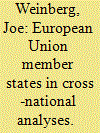| Srl | Item |
| 1 |
ID:
118182


|
|
|
|
|
| Publication |
2012.
|
| Summary/Abstract |
This article builds off of previous work by Rogowski and Kayser (2002) and Chang, Kayser, and Rogowski (2008) in order to determine the effects of democracy styles on trade policy preferences. This work uses the common Stigler-Peltzman Framework of regulation and finds a bias that favors consumers in majoritarian systems and favors producers in proportional representation systems. Their measurement of bias leaves many gaps in the interpretation of their results, a problem that is remedied by using a more direct measurement of bias. This article uses a single policy, agriculture, in order to determine whether this evidence of consumer bias holds. While the results are largely in line with the previous work, the modeling style and the dependent variable of choice strengthens the results and the connection to the theoretical framework of Stigler and Peltzman.
|
|
|
|
|
|
|
|
|
|
|
|
|
|
|
|
| 2 |
ID:
146186


|
|
|
|
|
| Summary/Abstract |
Many empirical models make assumptions about the primacy of domestic politics that fail to accommodate new trends in supranational policy making. Scholars now acknowledge that national political decisions often depend on other countries, international institutions, or global economic conditions. More interestingly, many sovereign countries have either lost or purposely delegated away policy autonomy to supranational institutions. For example, fixed exchange rates, regional trade agreements, and transnational regulations create the distinct possibility that domestic politics no longer provide a sufficient explanation for many policy outcomes. In some respects, two types of countries now exist: those that retain decision-making authority over a given policy space and those that do not. Combining both types of countries into a larger cross-national sample may generate flawed substantive results and fails to adequately test hypotheses. I use the example of European Union (EU) governance over trade policy to demonstrate the empirical dangers of disregarding differences in policy autonomy among countries.
|
|
|
|
|
|
|
|
|
|
|
|
|
|
|
|